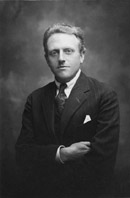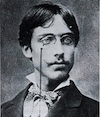There are many fantastic poems in Swedish. On this page I share English translations of a few poems I have attempted to translate on my own. Note that I am a complete amateur in this area. Also note that while I have tried to stay true to the original metre, often this has not been possible because I have failed to identify a suitable sequence of English words that accurately represent the poem and satisfy the metre. In such instances I have prioritised translating my estimation of the true sentiment of the poem, rather than following the metre.
Pär Lagerkvist
 Pär Lagerkvist (1891–1974) received the Nobel Prize in
Literature in 1951 and wrote the famous novels The
Dwarf (1944) and Barabbas
(1950). He was
brought up in a deeply religious Christian home in the Swedish
province of Småland and received a university education
at Uppsala University. His works often examine what
constitutes good and evil, such as the novels
Barabbas, The Dwarf and The Hangman. In addition
to writing novels, Lagerkvist also wrote many Swedish poems.
Many of these are coloured by his religious upbringing and his
fear of death. I have so far only translated one of his poems,
Det är vackrast när det skymmer (it is fairest in the gloaming air). It is one
of his most famous poems and it is often recited at funerals in
Sweden.
Pär Lagerkvist (1891–1974) received the Nobel Prize in
Literature in 1951 and wrote the famous novels The
Dwarf (1944) and Barabbas
(1950). He was
brought up in a deeply religious Christian home in the Swedish
province of Småland and received a university education
at Uppsala University. His works often examine what
constitutes good and evil, such as the novels
Barabbas, The Dwarf and The Hangman. In addition
to writing novels, Lagerkvist also wrote many Swedish poems.
Many of these are coloured by his religious upbringing and his
fear of death. I have so far only translated one of his poems,
Det är vackrast när det skymmer (it is fairest in the gloaming air). It is one
of his most famous poems and it is often recited at funerals in
Sweden.
It is fairest in the gloaming air
(Det är vackrast när det skymmer)
It is fairest in the gloaming air.
All the love the heavens bare
is collected in a dusky light
above the earth,
above the city light.
All is love, caressed by hands.
The Lord himself will vanish distant strands.
All is near, all is far away.
All is given
man for today.
All is mine, and all shall be taken away from me,
within moments all shall be taken away from me.
The trees, the clouds, the earth I face.
I shall wander—
alone, without a trace.
Original by P. Lagerkvist, published in the collection
Kaos, 1919.
English translation by P.O. Kristensson, 2011.
Gustaf Fröding
 Gustaf Fröding (1860–1911) is one of the most famous
poets in Sweden. He received a university education at Uppsala
University. His poems often relate to the less fortune in
the hard economic and social climate that characterised
Sweden during his time. He also lived a hard life of his own
and he never had any success with women. He spent his later years in various mental institutions and hospitals. I have attempted to
translate two of his most well-known poems into Swedish,
En kärleksvisa (a love song) and En
ghasel (a ghazal).
Gustaf Fröding (1860–1911) is one of the most famous
poets in Sweden. He received a university education at Uppsala
University. His poems often relate to the less fortune in
the hard economic and social climate that characterised
Sweden during his time. He also lived a hard life of his own
and he never had any success with women. He spent his later years in various mental institutions and hospitals. I have attempted to
translate two of his most well-known poems into Swedish,
En kärleksvisa (a love song) and En
ghasel (a ghazal).
A love song
(En kärleksvisa)
I purchased my love for money,
there was nothing else I could get,
sing angelic, you rasping strings,
sing angelic of lovers yet.
That dream, that never came true,
that dream was angelic to get,
for him, who is banished from Eden,
is Eden an Eden yet.
Original
by G. Fröding, published in the collection
Gralstänk, 1898.
English translation by P.O. Kristensson, 2011.
A ghazal
(En ghasel)
I stand and watch the world through iron bars;
I can, I must not release these iron bars,
it is so soothing to watch, how life abounds
and washes high waves against the iron bars,
so painfully bright and enticing it sounds,
when laughter and songs trickle through the iron bars.
Light shifts of aspen and alder and birch,
and above the precipice dark as pine,
fresh fragrances trickle through the iron bars.
And above the bay a majestic light,
within each drop an emerald shines bright,
watch, the divine glitter through the iron bars!
It abounds sail ships there and steamers too
with horn players and cheerful singers’ tunes
and thousands of joyous people wander,
cross country over hill and dale to feast;
I want, I want, I shall, I must escape
and taste life, if only for a single grape,
I must not vanish behind these iron bars!
In despair I shall bend, I shall scratch and batter
the old relentlessly hard iron bars
— they refuse to bend, they refuse to shatter,
for within myself I nailed and forged these iron bars,
and only once I shatter, shatter the iron bars.
Original
by G. Fröding, published in the collection
Gitarr och dragharmonika, 1891.
English translation by P.O. Kristensson, 2011.